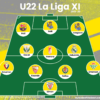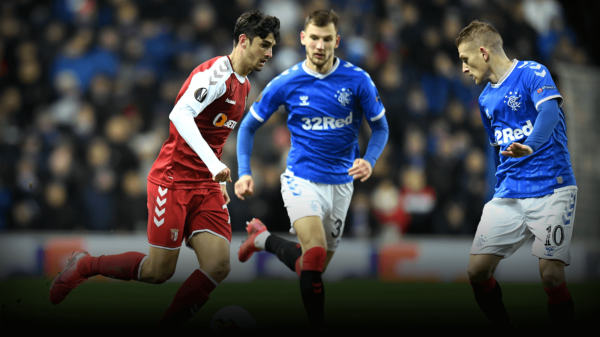Tom Robinson provides a comprehensive look ahead to the 2015 Copa Libertadores, with information on everything you need to know about the competition.
READ: Part 1 of the Copa Libertadores 2015 Review.

GROUP 5: ZAMORA (VEN), MONTEVIDEO WANDERERS (URU), BOCA JUNIORS (ARG), PALESTINO (CHI)
Having qualified thanks to a farcical play-off against Velez that shouldn’t have been played in the first place, Boca will nevertheless be one of the strongest teams on show. Steadily improving since the appointment of Rodolfo Arruabarrena, the Buenos Aires giants have been busy during the transfer window recruiting virtually a brand new defence and adding some extra quality to their midfield with Patricio Perez and Nicolas Lodeiro joining Fernando Gago and co., as well the marquee signing of maverick marksman Dani Osvaldo up front. Hardworking forwards Andres Chavez and Jonathan Calleri emphasise the youthful energy infiltrating a new look Boca and in Adrian Cubas, Franco Cristaldo and Guido Vadala there are some exciting prospects on the verge of breaking through. Los Xeneizes will be desperate to match the recent continental success of bitter rivals River and shouldn’t encounter too many difficulties in progressing to the knock out stages.
After 36 years away, Palestino mark their return to the Libertadores with a clash against Boca. The Chileans booked their place in the group stage after edging illustrious Uruguayans Nacional on away goals and could claim a few more scalps along the way. Under boss Pablo Guede, los Arabes play some neat tidy football and the likes of Leonardo Valencia and Marcos Riquelme will be the key men for the Santiago-based club. There will be a lot of eyes on highly rated goalkeeper Dario Melo, still just 20, who will be first choice now that the legendary figure of Felipe Nunez has moved to Hauchipato.
Uruguayan runners up Montevideo Wanderers will hope to succeed where Nacional failed and pip the Chileans to second place in the group. Los Bohemios will be without Sergio Blanco and Rodrigo Pastorini so the goalscoring impetus will now be on Gaston Rodriguez and Gerardo Gularte. There is a youthful presence running right through the team and a midfield comprising of the likes of Albarracin, Colombino and Galli will have to be at their best, especially after Sebastian Eguren moved on to Colon.
Reigning Venezuelan champions Zamora were achingly close to qualifying from a group containing Atletico Mineiro, the holders at the time, and Nacional Asuncion, who eventually finished as runners-up, last year and will aim to go one better in a kinder group. Pierre Pluchino will be tasked with replacing the goals of Juan Falcon, with the explosive Jhon Murillo and Anthony Blondell also helping the cause. The creativity of Pedro Ramirez will be sorely missed by the Furia Llanera but the double pivot of Vargas and Flores should provide a solid midfield base, while there are high hopes for 17-year-old academy product Yeferson Soteldo. Though Boca should be nailed on favourites to qualify, second place is well up for grabs.
GROUP 6: RIVER PLATE (ARG), JUAN AURICH (PER), SAN JOSE (BOL), TIGRES (MEX)
Copa Sudamericana champions River Plate will be massive favourites to top the group and will be among the most fancied sides in the whole competition. Under boss Marcelo Gallardo, River have been irrepressible at times, playing some scintillating vibrant attacking football, but have also displayed a pragmatic side when it mattered – a important quality to have in cup competitions.
Los Millonarios have retained the services of virtually all the members of the Sudamericana winning squad and have bolstered it further with the arrival of Uruguayan midfielder Camilo Mayada, the skilful Gonzalo ‘Pity’ Martinez and the legendary Pablo Aimar making an emotional return to the Monumental. Goalkeeper Marcelo Barovero, midfielder Carlos Sanchez, playmaker Leonardo Pisculichi and Colombian striker Teo Gutierrez will be key figures, as will young midfield lynchpin Matias Kranevitter who stands out amongst an impressive crop of youngsters.
As for the remaining sides, all three will fancy their chances of grabbing the second qualification spot. On paper Mexican outfit Tigres UANL should be favourites with players of the calibre of Egidio Arevalo Rios, Guido Pizarro and Joffre Guerron to call upon but are likely to field a B team and will somewhat of an unknown quantity. Bolivian side San Jose will hope to take full advantage of their home games, which will be played at an altitude of some 3,700m in Oruro, and can count on a strong Paraguayan contingent in their squad with Argentinian forward Mauro Bustamente likely to be the chief source of goals.
Finally, Peruvians Juan Aurich make up the group and with Luis Tejada, German Pacheco and Hernan Rengifo they may have the firepower to take them through, while Peru international Christian Ramos will be important in defence.
GROUP 7: ATLETICO NACIONAL (COL), BARCELONA (ECU), LIBERTAD (PAR), ESTUDIANTES (ARG)
Another of the strongest groups in the competition, whoever emerges from it will back themselves to go on a decent run. Colombian Apertura champions Atletico Nacional were beaten finalists in the Copa Sudamericana and will hope to follow it up with another strong showing. However, this is a slightly new look side after the departures of Edwin Cardona, Alexander Mejia – both to Monterrey – and Sherman Cardenas to Atletico Mineiro. A strong and settled defence remains, while the arrival of Camilo Vargas to challenge Franco Armani for the number 1 jersey gives the Verdolagas plenty of depth across the team. Juan Valencia will be an important presence in midfield and as Juan Carlos Osorio searches for more goals from his front line he has also brought in Andres Escobar and Paraguayan duo Pablo Velazquez and Pablo Zeballos to accompany the likes of Luis Ruiz, Orlando Berrio and Jonathan Copete. You get the feeling that if one of these forward pairings can strike up a partnership and hit a rich vein of form, Atletico could take some stopping.
Paraguayan champions Libertad have yet to lift the continent’s biggest trophy and will hope to go one better than compatriots Olimpia and Nacional Asuncion, the beaten finalists from the last two editions. The vastly experienced striker Rodrigo Lopez will be the principal goal threat while the signing of Oscar Ruiz from Capiata is an exciting one. Though there is plenty of experience throughout the squad, there are also a number of bright prospects emerging with Jorge Recalde and Ivan Ramirez getting plenty of first team action and Jesus Medina, Danilo Santacruz, Angel Benitez and Luis Amarilla all U20 internationals.
Ecuadorian runners-up Barcelona will be tough opposition but due to the fiercely competitive nature of the group may struggle to squeeze through. In goalkeeper Maximo Banguera and central defensive duo Luis Checa and Jose Perlaza they have a huge amount of experience at the back and Matias Oyola will have a big role to play in midfield. The loan signing of Brahian Aleman is an excellent piece of business after the Uruguayan midfielder had an impressive season for Arsenal de Sarandi and the arrivals of Marlon de Jesus, Henry Patta and Tito Valencia will take some of the goalscoring burden off first choice striker Ismael Blanco.
Last but by no means least, Estudiantes de la Plata took the remaining spot in group 7 after a 4-1 victory over Independiente del Valle. The four time champions may not be the strongest of the Argentinian sides but under Mauricio Pellegrino los Leones will be difficult to beat and capable of going toe to toe with the best in the competition, as they showed in the Copa Sudamericana quarter final versus River. Sebastian Dominguez and Leandro Desabato are a no nonsense centre back pairing and will be well supported by Uruguayan full backs Matias Aguirregaray and Alvaro Pereira. Young defensive midfielder Gaston Gil Romero is a leader on the pitch and Juan Sanchez Mino, on loan from Torino, is a terrific addition. An old fashioned number 9, Guido Carrillo is one of the better strikers in Argentina and partner in crime Diego Vera is a proven goalscorer. Also, keep an eye on precocious new boys Luciano Acosta and David Barbona who will add some creativity to the midfield.
GROUP 8: SPORTING CRISTAL (PER), RACING (ARG), GUARANI (PAR), DEPORTIVO TACHIRA (VEN)
Having won their first title in 13 years, Torneo de Transicion champions Racing should be expected to qualify relatively easily but it could be a deceptively tricky group for La Academia. With the inspirational Diego Milito leading the line, Racing possess that extra touch of class that many teams could only dream of and El Principe’s link up play with Gustavo Bou – the surprise revelation of last season – will make them a real danger going forward. What’s more they’ve added the exciting Brian Fernandez from Defensa y Justicia and look to have secured Carlos Nunez from Penarol too.
Goalkeeper Sebastian Saja is another important figure at the back, as is Ezequiel Videla in the middle of the park. Winger Ricardo Centurion has gone but his replacement, Paraguayan Oscar Romero, represents an improvement and he should quickly become a vital member of the squad. Diego Cocca has proven himself to be another promising manager to come out of Argentina and now faces the task of making the step up to the continental stage too.
Sporting Cristal look to be the strongest of this year’s Peruvian sides and shouldn’t be taken for granted. The Decentralizado champions have the influential presence of golazo expert Carlos Lobaton as well as a number of other seasoned pros such as Diego Penny, Adan Balbin, Josepmir Ballon, Horacio Calcaterra and Renzo Revoredo. There are goals in the team too with Sergio Blanco and Irven Avila, bolstered by the arrival of Cesar ‘Picante’ Perreyra from Belgrano. Despite this wealth of experience, there is a crop of young talent bursting through, most of whom made up the core of the Peru U20 team at the recent Sudamericano. Luis Abram and Alexis Cossio enjoyed great campaigns last year and they have been joined by fellow defensive prospect Josue Estrada, while Pedro Aquino, Alexander Succar and Luiz da Silva all made decent impressions for the national team too.
The last time Paraguayan runners up Guarani won a match in the Libertadores was back in 2004 but they should improve on their rotten recent record this time around. Centre forward Fernando Fernandez was in devastating form in 2014 scoring 34 goals and the man known as ‘Queso’ will be among the most lethal marksmen in the competition. Elsewhere in the team, Ivan Gonzalez is a mercurial talent who will provide goals from midfield, while Marcelo Palau will be important in his role shielding the defence. Ruben Maldonado and Julio Caceres have had long distinguished careers and will marshal the back four. El Aborigen will fancy their chances and should advance.
Having already shocked Cerro Porteno on their way to qualifying for the group stage, Venezuelan side Deportivo Tachira shouldn’t be underestimated either and could cause a few sides a problem or two. Captain Cesar Gonzalez is the heartbeat of the side and a goalscoring threat from midfield, as is veteran schemer Jorge Rojas, while Yohandry Orozco, formerly of Wolfsburg, is a skilful wideman. German Rivas will be charged with getting the goals and in defence 22-year-old Wilker Angel is a highly rated centre back who already has over 100 appearances to his name and scored on his international debut against Bolivia. Venezuelan teams usually bow out at the group stage but this might be the year that changes.
Written by Tom Robinson
You can find more at @tomrobbo89
- 2020 Argentinian Primera: Young Players To Watch - November 26, 2020
- Scout Report: Agustin Urzi | Banfield And Argentina Winger - October 13, 2020
- 2020 Brasileirao’s 10 Young Players To Watch - September 10, 2020



























































